Intel Core i7-11700K Review: Blasting Off with Rocket Lake
by Dr. Ian Cutress on March 5, 2021 4:30 PM EST- Posted in
- CPUs
- Intel
- 14nm
- Xe-LP
- Rocket Lake
- Cypress Cove
- i7-11700K
Gaming Tests: F1 2019
The F1 racing games from Codemasters have been popular benchmarks in the tech community, mostly for ease-of-use and that they seem to take advantage of any area of a machine that might be better than another. The 2019 edition of the game features all 21 circuits on the calendar for that year, and includes a range of retro models and DLC focusing on the careers of Alain Prost and Ayrton Senna. Built on the EGO Engine 3.0, the game has been criticized similarly to most annual sports games, by not offering enough season-to-season graphical fidelity updates to make investing in the latest title worth it, however the 2019 edition revamps up the Career mode, with features such as in-season driver swaps coming into the mix. The quality of the graphics this time around is also superb, even at 4K low or 1080p Ultra.
For our test, we put Alex Albon in the Red Bull in position #20, for a dry two-lap race around Austin. We test at the following settings:
- 768p Ultra Low, 1440p Ultra Low, 4K Ultra Low, 1080p Ultra
In terms of automation, F1 2019 has an in-game benchmark that can be called from the command line, and the output file has frame times. We repeat each resolution setting for a minimum of 10 minutes, taking the averages and percentiles.
| AnandTech | Low Resolution Low Quality |
Medium Resolution Low Quality |
High Resolution Low Quality |
Medium Resolution Max Quality |
| Average FPS | 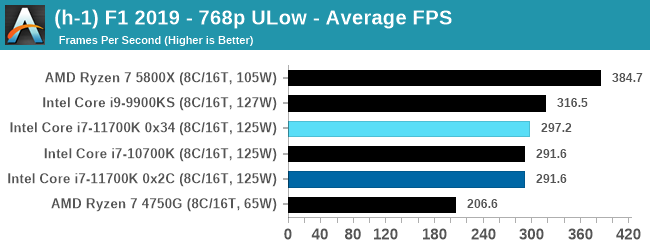 |
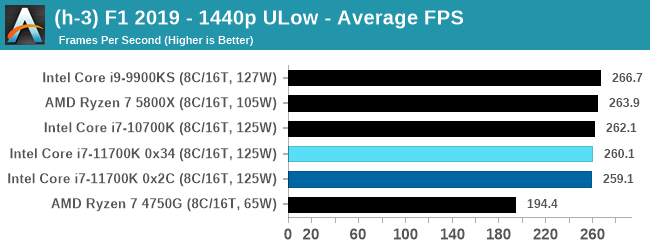 |
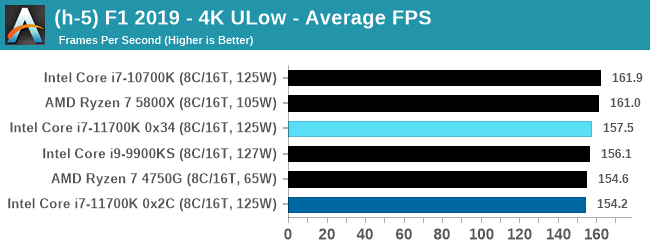 |
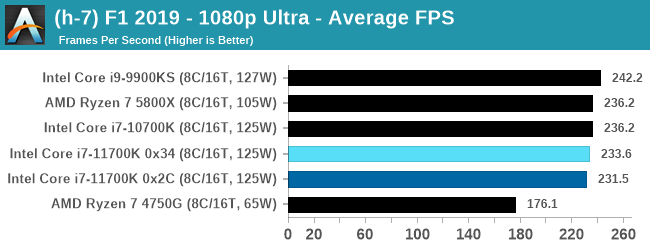 |
| 95th Percentile | 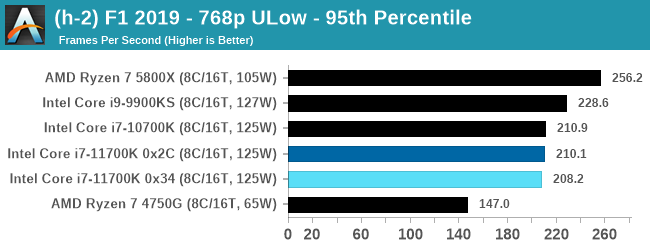 |
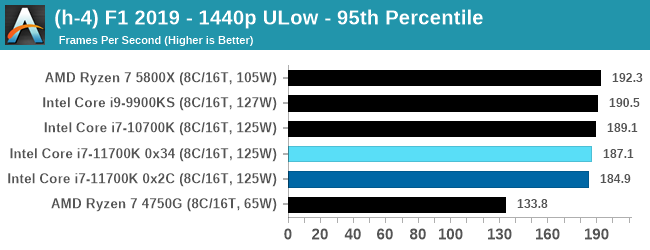 |
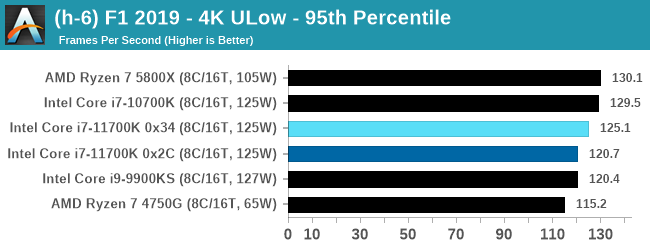 |
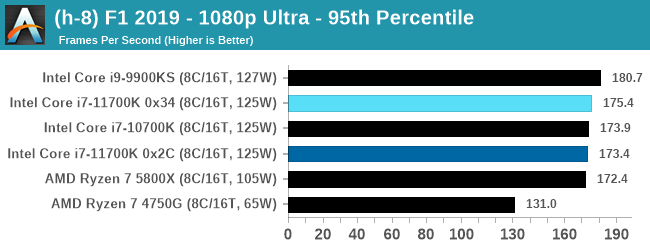 |
The Ego engine is usually a good bet where cores, IPC, and frequency matters. Despite this, the 11700K isn't showing much of a generational improvement.
All of our benchmark results can also be found in our benchmark engine, Bench.












541 Comments
View All Comments
CiccioB - Friday, March 5, 2021 - link
I would like to know what you will say if Anantech will do the same with AMD Ryzen 4, that is reviewing it on an early motherboard with a beta BIOS and not yet tuned microcode and it will result not being as fast as you would expect (or hoped it to be) one month head of the actual release date.And present it as an official review of the product.
I would bet you (and your "friends") would go and cry out for a payed article by Intel to make AMD product look worse that it really is "like the good old times when it payed everywhere on Earth to not make AMD sell its products".
supdawgwtfd - Friday, March 5, 2021 - link
Except it appears the CPU is operating at advertised performance levels...It provides +19% improved performance for some things but not others.
the_eraser1 - Friday, March 5, 2021 - link
It would actually be fine because Zen 4 is already showing 30% performance uplift clock-for-clock, and that's a full year ahead of launch.Be honest with yourself. Achieving even a 5% uplift with microcode optimizations ahead of launch is a pipe dream. The review successfully shows the kind of performance you would expect. Is there room for improvement over time? Of course, but that applies to any product.
CiccioB - Friday, March 5, 2021 - link
I'm not speaking about the improvements in IPC. IPC is not everything to evaluate a product. If that were true ARM chip would be the winner since early '90s.I'm speaking about the fact that in many tests shwn here this architecture shows worse results than the previous one. That would mean there's something really broken in the architecture or in the SW they execute.
About Zen 4, don't old your breath because 5nm for HP are not that close. Even Intel Ocean Cove is said to be the really new revolutionary architecture that is finally going to show what the new 7nm PP could have really brought if it was available today as we speak.
These are speculations, while this chip will be out in less than a month and waiting for the final tuning would have just made a better service to anyone that really wants to know how really it behaves. Not how it looks like on a unknown motherboard with a not updated BIOS and not the final (or even the first version) of the microcode.
the_eraser1 - Friday, March 5, 2021 - link
This performance from RKL is unsurprising if you had been paying attention. We've known for months that Intel hasn't had great results with RKL and that's why they're pushing for Alder Lake ASAP.Once again, you cannot honestly expect substantial performance uplifts a month before launch. It's possible the ring/uncore frequency was low for this review, however that will only make a significant difference in games, or other latency sensitive scenarios.
As for Zen 4, I know for fact from reputable sources that it's coming around the middle of 2022, with large uplifts in performance.
Qasar - Saturday, March 6, 2021 - link
" I'm speaking about the fact that in many tests shwn here this architecture shows worse results than the previous one. That would mean there's something really broken in the architecture or in the SW they execute. " no your crying cause intel still lost. and that well. rocket lake, isnt the performer it was made out to be. AND it looks like some of the performance regressions, were explained/accounted for, in the review, which you obviously did not readOtritus - Saturday, March 6, 2021 - link
Originally ocean cove was leaked to be a revolutionary architecture with a massive ipc uplift that can serve as the backbone for future architectures like Conroe did in the original Core2 line. Leaks have later said that Intel cancelled the revolutionary nature of the product and ocean cove is simply going to be another microarchitecture like sunny or golden cove. By that point AMD should have zen 5 and we the consumer can enjoy healthy competition.As to the point on how it really behaves. We can see from the frequency graphs that rocket lake is turbo boosting as it should. A new BIOS could change power limits which would change behavior, but when rocket lake is already given infinite turbo time, such changes are likely to lead to performance regressions. The only other possibility is that the slight maturation of the bios leads to a small performance uplift. This WOULD BE IPC, but such improvement would be small at best given that z590 (and the similar sunny cove) has been out for a while. At best gaming performance may not suck as hard (or be fixed), but overall the performance improvements should be less than 5%. Not enough to change any conclusion.
My only gripe is the usage of "review" over something that indicates it's a pre-release product. However, given that Intel themselves didn't have any comments on the article, the final performance is likely to be so similar that this is basically the review of the final-release product.
Spunjji - Saturday, March 6, 2021 - link
They've already done that with a bunch of AMD products - like the OEM-only 4000 series APU and the weird Xbox One S APU desktop board.Speaking as a tech enthusiast, if they get hold of Zen 4 before release and can do a preview that doesn't break NDA, I would be over the moon. I love to get an idea of how a release will shape up, as long as there are caveats that it may not be final performance - which is exactly what we got here.
Timoo - Monday, March 8, 2021 - link
I'd Lóve it!Beta BIOS might be a slight disadvantage, but we've seen it with the release of ZEN1. At the time everyone blamed the BIOS for memory compatibility, etc. etc. etc.
In the end, not much improvement was found, once stable BIOSes were out. Bugs were fixed, but ZEN1 was still not beating Intel.
TheinsanegamerN - Monday, March 8, 2021 - link
It would still match the expected out of box performance. Stop being so salty over Intel sucking the big one, RKL is a total dud performance wise, a microcode tweak is not going to increase IPC. It already boosts to where it should be and draws LMFAO power.